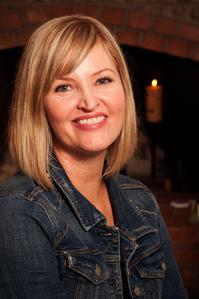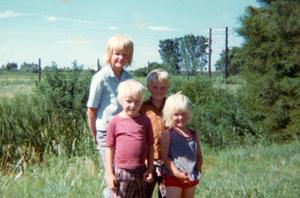
|
|
Ruth Wariner was 15 years old when she left the polygamist Mormon colony where she grew up in Chihuahua, Mexico, and took her siblings with her to California. She raised her three youngest sisters while earning her GED and putting herself through college and then graduate school, eventually becoming a high school Spanish teacher. She now lives in Portland, Ore., where she remains close to her siblings and is happily married. The Sound of Gravel is her first book.
When did you know you wanted to write this story? How long did it take?
There was one specific moment when I realized I needed to write my story. It was late May in 1995, and I was 23 years old. My three youngest sisters, Elena, Leah and Holly, who were 12, 10 and eight at the time, and I were living in Grants Pass, Oregon, and eating a lunch that we'd ordered from the dollar menu at Burger King. We were sitting there when out of the blue, Leah asked, "So what happened to our mom anyway?" I was stunned by the question and suddenly realized that I had never told my sisters the story of where we came from.
That was when I began thinking about writing my memoir. But I was in college, and had full responsibility of my sisters. I was working a part-time job with barely enough time to do my homework. After I finished graduate school a few years later and started teaching, I began taking memoir and creative nonfiction writing classes after work. By then my sisters had grown and moved out of my apartment, but still, I wanted them to know who our mother was--or at least to know her as I had known her. I wanted them to know where we had come from and why we had to run away and grow up without parents.
Once I was ready to sit down and actually start writing The Sound of Gravel, it took me almost five years to finish. I couldn't spend more than a few hours a day writing and often had to step away for a break, especially when I wrote about my most painful memories. There were times when it took me a few days to get back to finishing a disturbing scene.

|
|
| Clockwise from left: Luke. Matt, Audrey, Meri (on Kathy's lap), Aaron and Ruth | |
Why did your story need telling, other than for your sisters?
My reasons for writing have always been very personal: I wanted to share my memories with my siblings--for their own healing and to help them understand the life we left behind. The more I wrote, the more I recognized my own need to process those most heartbreaking parts of my life and to express how I felt about those moments. It's never been my intention to promote a particular cause or belief system, nor is it my intention to disparage any readers' own beliefs or religion.
This retelling was painful. What made that process worthwhile?
The story was definitely a hard one to tell, but it has been an incredibly healing journey. Some of my memories bothered me more than I had expected them to. I hadn't thought about my younger sister Meri in years, but when I wrote the scenes with her in them, I did so through tears.
Revisiting my mother's life and writing about her in detail was also amazingly cathartic. Looking at photographs of her and remembering the way she smelled, the sound of her voice, the way she combed her hair, the way she smiled and the light freckles on her skin brought her back to me in a very raw and real way. Being able to think about her choices from a more adult perspective also helped. As I've grown and reflected on my own life and my relationship to the world, I realize my mom didn't have a lot of self-love and self-acceptance. She chose a life and a belief system that reflected how she felt about herself.
Even though I know I'll have to talk about my childhood in the coming months, I feel like I left so much of my past on those pages, which has made it easier for me to talk about. I'm grateful for the opportunity to share my experience. Writing this book also ended up being a process of self-discovery and personal healing. I feel like I found a voice I honestly didn't know I had. I needed to recognize for myself that my life, my experience and what I had to say about it matters. This was especially important for me after growing up in a large, chaotic household where I really wasn't heard.
You're narrating the audiobook yourself. How has that project played out?
I actually just finished recording the audio book yesterday. I hadn't considered reading myself but the Macmillan team felt that because the memoir is written in such a personal way, it needed to be read and recorded in my voice. The idea of reading it aloud to people really frightened and intimidated me, and I was so nervous that I broke out into hives the day before I started recording! When I finally sat down in the tall chair in front of the microphone with a digital version of my book in front of me, my throat became dry and tight, and my voice trembled. But after reading a few paragraphs and taking a few deep breaths, I felt more relaxed and was able to get into the flow of a natural reading pace. I ended up spending three full days in the studio with a fantastic recording team, and even though it was really hard, emotional work, and even though I felt completely out of my comfort zone, I'm so grateful to have had the opportunity to record my book and feel that it will be more powerful for listeners.
 |
|
| Audrey, Matt, Luke and Ruth, Colonia LeBaron, 1977. | |
You've shared many personal details. Did you choose to withhold any?
I chose to leave out some details of my siblings' experience in the Colony because their stories really aren't mine to tell. I only wanted to share the details of their lives in relation to how they intertwined with my own. But when it came to my story, I honestly didn't hold anything back. I have nothing to hide.
What do you want people to know about you that's not in your book?
I'm still really close to my siblings on my mother's side. All of us except for Matt, who is still a committed member of my dad's church, live in the Pacific Northwest. We spend every holiday together and are a strong support system for each other. Growing up in the kind of poverty we did made our bond with each other stronger; we just didn't have enough stuff (electronics, cable TV, computers, etc.) to distract us from each other. Growing up without parents also secured and strengthened our bond, and I am incredibly grateful that we were able to stay together through very challenging situations. For me, it's important that my readers know this because in spite of our troubled childhood, there has been so much goodness and joy that has grown and blossomed. We grew stronger than our circumstances. --Julia Jenkins

